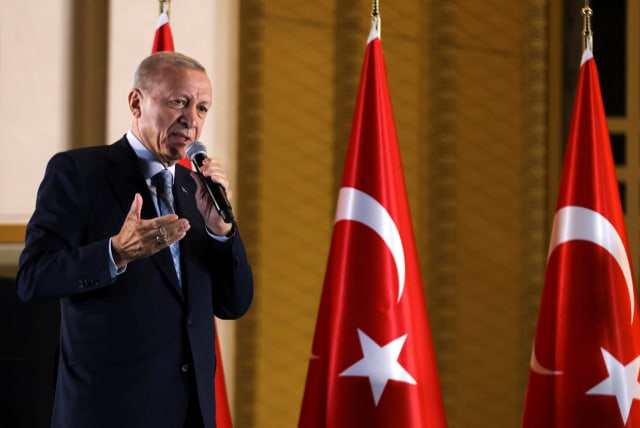No more Mr. Nice Guy following Turkey's actions - editorial

While Israel had been seeing some semblance of a growing relationship with Turkey, there is no going back from their response following October 7.
Turkish President Tayyip Erdogan has made it clear, once and for all, that despite the talks, the friendly back-and-forth, and the warming relationship that appeared to be developing until a short while ago, Israel and Turkey are not going to be allies anytime soon – at least not on his watch.
On Monday, the Turkish leader said that Prime Minister Benjamin Netanyahu will be tried as a war criminal over Israel’s ongoing offensive in the Gaza Strip, referring to the Israeli leader as the “butcher of Gaza.”
This narrative has been consistently maintained by the Turkish president since the war first broke out, even as over 1,200 Israelis were massacred at the hands of Hamas terrorists who broke into towns and private homes, setting fire to houses and raping partygoers.
Maintaining a narrative
Shortly after the war broke out, Turkey condemned the civilian deaths that resulted from Hamas’s October 7 massacre but also urged Israel to react in a restrained way.
A week into the war, Turkish Foreign Minister Hakan Fidan held a call with Hamas leader Ismail Haniyeh to discuss a potential release of civilian prisoners. That was the most amicable behavior seen in Turkey, and there has been nothing like it since.
Much to the contrary: Turkey has consistently maintained its condemnation of Israel’s defensive military campaign in Gaza, which is controlled by Hamas, while claiming that Hamas is not, in fact, a terrorist organization.
“Hamas... is a liberation group, mujahideen waging a battle to protect its lands and people,” Erdogan said two weeks after the war broke out.
Several days later, he claimed Israel was committing “war crimes.”
“We will tell the whole world that Israel is a war criminal. We are making preparations for this. We will declare Israel a war criminal,” he said
As diplomats were recalled from Turkey and Israel alike, it became clear that the facade Erdogan once maintained of a warming relationship between Israel and Turkey was just that: a facade.
Israel is a “terror state,” he maintained two weeks ago, calling its military effort in Gaza “the most treacherous attacks in human history.”
His attacks weren’t targeted at Israel alone: He lashed out, in fact, at any country that expressed any form of support for the Jewish state, including “the West” as a whole.

“Those who feel indebted to Israel cannot speak freely. We did not go through the Holocaust process; we don’t have such a situation, because our respect for humanity is different,” Erdogan said in mid-November during a joint news conference with German Chancellor Olaf Scholz.
Last week, Erdogan told United Nations Secretary-General Antonio Guterres that Israel “continues to shamelessly trample on international law, the laws of war, and international humanitarian law” and must therefore “be held accountable for the crimes it committed in front of international law.”
Finally, on Monday, he told the Organisation of Islamic Cooperation (OIC) committee in Istanbul that “Israel is not only a murderer but also a thief” and that Netanyahu must be tried as a war criminal because he is the “butcher of Gaza.”
There is no going back from these statements.
While Israel had been seeing some semblance of a growing relationship with Turkey after a long bout of strained ties brought on by the 2008 crisis in their relations, and while Israel had been willing to put Erdogan’s past outlandish comments behind it in order to facilitate a warming of ties, his recent ones signal a rupture that will not be mended anytime soon.
It is one thing to criticize the Israeli government’s actions during this war, or even in the lead-up to the war. It is quite another thing entirely to suggest that the State of Israel and its leader are war criminals as they fight a defensive war forced on them by a terrorist group that just committed the greatest massacre of Jews since the Holocaust.
There is plenty of room for legitimate criticism in international relations, but this is not criticism: it is the desperate cry of a leader who thinks his actions will not carry any consequences.
It is time for Israel and the international community to show him that this is not the case.
